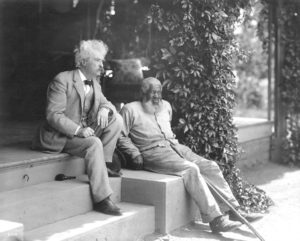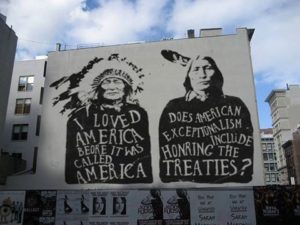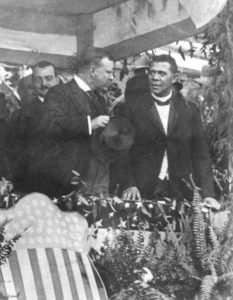Current events point to a future that forces whiteness into a state of chronic self-irritation. This week we have seen Muhammad Ali is being honored and memorialized no differently than a head of state. In his hometown of Louisville, Kentucky, he went from not being able to enjoy the use of equal facilities or sit at counters to having streets and buildings named after him. While we celebrate the life of this great American leader, we are called to recognize the extreme contrast between this example and the current campaigns and Twitter accounts of white supremacy. Calls that the Tea Party movement of 2010 signaled the “last gasp” of white supremacy were premature and ironically relied themselves upon the hypnosis of false superiorities. We need not rely on anything of the kind! Instead, we witness the public about-face by endorsers and supporters and deep inflictions of embarrassment as they look in the mirror and ask, “This is what our party has come to?” Sure, some of them are pretending to disavow Trump’s racism and sexism while secretly applauding it, but they clearly know as good “realists” that their “brand” and party are being undone and surrendering power for generations to come. Like the hell-dwellers of Dante’s Inferno, these sympathizers of racial toxicity have become nauseous from walking in the quagmires of infernal knowledge. Similar to the swift realization of the vulnerability that whites sensed in 1830s America that prompted the creation of Liberia and go back to Africa movement; the haunted chime of “it’s too late” roars quite loudly today.
 Senate majority leader Mitch McConnell, for example, was asked three times on NBC’s Meet the Press whether Trump’s latest insults against “Mexican” judge Gonzalo Curiel were “racist” and answered by talking in circles of politically correct gibberish. South Carolina senator Lindsey Graham said of his party’s own nominee “This is the most un-American thing from a politician since Joe McCarthy […] There’ll come a time when the love of country will trump hatred of Hillary.” Establishment leaders have created their own hell without an escape; for nobody else could have created it for them. On top of this, demographics indicate an inevitable future of non-white trends; white privilege leads in the resistance or unwillingness to embrace such a radical trajectory and volatile American character. It is the freedom of the underprivileged that America sells to the world today while seeking to conceal the conspicuous freedom of white privilege. Likewise, the influx of refugees across Europe has triggered an uncertainty and panic akin to post-Columbus North America. Racists and bigots who never wanted to have a dialogue historically with others now just want to have a meaningful place at the table for any discussions. Moral arguments signal the demise of white supremacy and the desire to transcend historical polarities, along with the wreckage they cause. White supremacy now feeds on the post-racialist fantasy of seeing the world through the eyes of dogs, seeking to instill an equality fit for colorblind canines. We live in a time more than ever, in which we can sense a glimpse of hope that African Americans and other minorities are not the perpetual victims of history, anymore than other people. Indeed, it is not an exaggeration to believe that the damage has already been done. The ways of justice, like those of Mother Nature, do not discriminate and no ethnic group is without its own tragedies and downfalls.
Senate majority leader Mitch McConnell, for example, was asked three times on NBC’s Meet the Press whether Trump’s latest insults against “Mexican” judge Gonzalo Curiel were “racist” and answered by talking in circles of politically correct gibberish. South Carolina senator Lindsey Graham said of his party’s own nominee “This is the most un-American thing from a politician since Joe McCarthy […] There’ll come a time when the love of country will trump hatred of Hillary.” Establishment leaders have created their own hell without an escape; for nobody else could have created it for them. On top of this, demographics indicate an inevitable future of non-white trends; white privilege leads in the resistance or unwillingness to embrace such a radical trajectory and volatile American character. It is the freedom of the underprivileged that America sells to the world today while seeking to conceal the conspicuous freedom of white privilege. Likewise, the influx of refugees across Europe has triggered an uncertainty and panic akin to post-Columbus North America. Racists and bigots who never wanted to have a dialogue historically with others now just want to have a meaningful place at the table for any discussions. Moral arguments signal the demise of white supremacy and the desire to transcend historical polarities, along with the wreckage they cause. White supremacy now feeds on the post-racialist fantasy of seeing the world through the eyes of dogs, seeking to instill an equality fit for colorblind canines. We live in a time more than ever, in which we can sense a glimpse of hope that African Americans and other minorities are not the perpetual victims of history, anymore than other people. Indeed, it is not an exaggeration to believe that the damage has already been done. The ways of justice, like those of Mother Nature, do not discriminate and no ethnic group is without its own tragedies and downfalls.
Going all the way back to Plato’s Allegory of the Cave in the Republic, one’s salvation can be found in the relocation out of a previous hell into the hope for a non-hell. Irony is an essential American virtue. While wanting to enjoy the benefits of global selves, too many Americans still find solace in those parochial values of homogeneity and fear and panic-laden bigotries. Such sentiments provide a false sense of security and complacency. No notion of a homeland applies nor can be equated with American life—modern globalization has thrown the concept of homeland into perpetual crisis. American identity is forever entwined with the risks and movements into wider worlds. Freedom and privilege of opportunity must endure inconveniences from the outside. To be American requires that one take up the burden to always reinvent oneself. In the spirit of the Roman maxim—“Where there is the good life, there is my country” (ubi bene ibi patria)—Americans embody the ethos of what Peter Sloterdijk calls “nautical selves.” “The nautical spirit requires not foundations but terminals, remote destinations and inspiring port connections.” The self-enclosure mainstream Americans prefer is radically dangerous and un-American. Forces of this kind inhibit the necessary demands of a multifarious, interconnected world full of polyethnic peoples and multi-local rituals. As peoples and places grow unattached we are called to embrace uprootedness—a true cornerstone of liberty and salvation. Slavery lies in uprootedness, and the unbearable means of finding an escape. One can only be presented the opportunity to flee from hell until they experience the horror and agony of finding themselves in it.
Here Afro-Americans and minorities have much more to teach whites or other privileged folk in showing the struggle and tenacity required to escape a living hell. They not only have been confronted with the burden to move forward without knowing, but could never afford to take freedom for granted. Like people today who cannot be bothered because they have everything at their fingertips, white privilege speaks of a freedom certain folks “already have” that needs only to be defended. But if all you need to do is secure what is already given then aren’t you conceding the very freedom you claim to fight for? White privilege has generated a comfort and security that mostly grows static and stagnate. As Alfred North Whitehead writes, “Those societies which cannot combine reverence to their symbols with freedom of revision, must ultimately decay either from anarchy, or from the slow atrophy of a life stifled by useless shadows” (Symbolism Its Meaning and Effects, p.88). White privilege and Eurocentrism is becoming such a shadow. Nostalgia for what was or could have been is not the way forward. Disinherited peoples are truly hungry and anxious for freedom, without any nostalgic desire to turn back to what once was! It is in this sense that they are tomorrow’s leaders in a post-Obama world.
I don’t like the title Roots to describe existence of African dehumanization as portrayed through the enslavement of Kunta Kinte. The title should rather be Uprooted because that would be more accurate. Uprooted experiences are what all must come to expect with life in the twenty-first century! As Americans we especially are cultural nibblers who play or pick at information and self-inscribed narratives. Individuals are less beholden to past norms and loyalties as more possibilities makeup the social architecture with room for growth and adventure. While technology, data-imaging, and enhanced cultural engagement are infectious and force us to think about moving forward, we witness shrewd efforts to defy the pluralistic impulse of the times. The Tea Party, All/Blue Lives Matter, and Make America Great Again movements are all reactionary to Black-led initiatives. Who else was the founder of the Tea Party other than Obama? How often have establishment-led movements had to be reactionary to the cries of Black and Brown victims? We are witnessing that wave of pent up anger and animosity against those who were unjustly singled out for campaigns of dehumanization and have justice on their side. The horrible reality of slavery and racism, treated by whites as a shameful secret they don’t want told, must be faced. The more our world moves to confront and sincerely condemn such savagery, the more backlash and striking out will occur no matter how ridiculous it sounds. Throughout history, we find countless cases like the Catholic Church’s Inquisition of pre-civilized tactics used to ward off perceived dangers to the power structures. As the forces of pluralism and diversity widen and become more pervasive, you will have more of a backlash by a white privilege that feels its power and legacy threatened! When people feel their backs up against the wall they want to tighten the reigns and strike out. Bans, bathroom laws, and building walls are desperate, pathetic measures of backward thinking in a world as porous and malleable as ours. Within the American ethnoscape, white supremacy is being put on the defensive like never before. Clintons and Trumps, Democrats and Republicans, are clearly viewed by all but the super-naïve as the choice between the worst of two evils.
As Europe and white America scoff at the reality that all roads do not lead to Rome, they will learn from the class, grace, and inspiring humility displayed by the uprooted—black people. As a race they lead the world in showing how one must endure in the face of unspeakable hardships and tragedies like the South Carolina massacre a year ago. That same display of humanity that forced Mark Twain to call African American leader Booker T. Washington “a man worth a hundred Teddy Roosevelts, a man whose shoe-lachets Mr. Roosevelt is not worthy to untie” (Autobiography of Mark Twain, Vol. 3, 2016, p.257). Ever since Roosevelt pulled that publicity stunt of having “the first Negro to dine at the White House”—a house Washington’s ancestors built—white America has relied on such associations within the pantheon of coolness. Even racists like Trump are outsiders who desperately want to hang out with the Alis, Jordans, or Jim Browns and step out of the staleness and “repetition” of white privilege that knows fully well when it comes to cultural trends, “It is without any fruit of reaping value” (A. N. Whitehead, Adventures of Ideas, 278). There is a radical reciprocity that blurs the lines between perpetrator and victim and we cannot ignore the current escalation of white frustration in finding itself on the outside looking in on the “invasions” of its homeland. As Sloterdijk argues “Anyone living today, after Magellan and after Armstrong, is forced to project even their home town as a point perceived from without. The transformation of the Old World into an aggregate of locations reflects the new reality of the globe as it revealed itself after the circumnavigation [and quantification] of the earth. The location is the point in the imagined world at which the natives grasp themselves as grasped from the outside; it is what enables the circumnavigated to return to themselves.”

Mark Twain with his friend, John Lewis, in the permanent collection of the Mark Twain House & Museum




